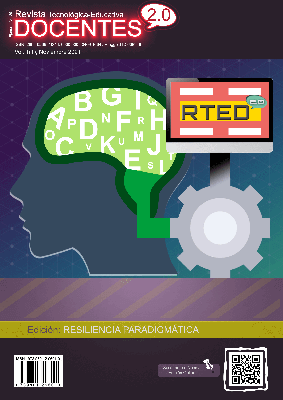Theory of Information Processing Mediated by The Blackboard for Teaching English
 DOI:
https://doi.org/10.37843/rted.v1i1.260
DOI:
https://doi.org/10.37843/rted.v1i1.260
Main Article Content
Abstract
In recent times, education has been impacted by various technological advances. These changes have significantly influenced educational agents who put into practice new teaching and learning methods through tools that facilitate the processing of information differently and thus carry their own learning pace. The objective that guided this research was to analyze Gagné's information processing theory mediated by the Blackboard platform to acquire the English language. To achieve analysis was framed in a qualitative approach, which was developed in four phases: planning, action, observation, and reflection. In this research, five teachers with education knowledge and seven students were selected as key informants. In the present work, Gagné's theory was current, which refers to how students process information. This theory was found mediated using the Blackboard platform as a tool for learning English. As a result, a flexible education was appreciated when using this tool, which allowed the student to transmit and produce information obtained from these technological tools, regardless of time or place. In conclusion, through ICT, the students used digital and pedagogical tools to build knowledge based on their previous knowledge, creating more meaningful learning to understand English.
Downloads
Metrics
Article Details

This work is licensed under a Creative Commons Attribution-NonCommercial-NoDerivatives 4.0 International License.
Those authors who have publications in our journal accept the following terms:
- When a work is accepted for publication, the author retains rights of reproduction, distribution of his/her article for exploitation in all countries of the world in the format provided by our magazine and any other magnetic medium, optical, and digital.
- Authors will retain their copyright and guarantee the journal the right first to publish their work, which will be simultaneously subject to the Creative Commons Acknowledgment License (Attribution-NonCommercial-NoDerivatives 4.0 International (CC BY-NC-ND 4.0)). That allows third parties to copy and redistribute the material in any medium or format, under the following conditions: Acknowledgment - You must properly acknowledge authorship, provide a link to the license, and indicate if any changes have been made. You may do so in any reasonable way, but not in a way that suggests you have the licensor's endorsement or receive it for your use. NonCommercial - You may not use the material for a commercial purpose. NoDerivatives - If you remix, transform, or build from the material, you cannot broadcast the modified material. There are no additional restrictions - You cannot apply legal terms or technological measures that legally restrict you from doing what the license allows.
- Authors may adopt other non-exclusive license agreements to distribute the published version of the work (e.g., deposit it in an institutional archive or publish it in a monographic volume) provided that the initial publication in this journal is indicated.
- Authors are allowed and recommended to disseminate their work through the Internet (e.g., in institutional telematic archives, repositories, libraries, or their website), producing exciting exchanges and increasing the published work's citations.
- Request of withdrawal an article has to be done in writing by the author to the Editor, becoming effective after a written response from the Editor. For this purpose, the author or authors will send correspondence via e-mail: [email protected].
- The author will not receive financial compensation for the publication of his work.
- All Docentes 2.0 Journal publications are under the Open Journal System (OJS) platform at: https://ojs.docentes20.com/.
References
Arteaga, C. (2016). Uso de las TIC para el aprendizaje del inglés en la Universidad Autónoma de Aguascalientes. Apertura.
Beltrán-Lleras, J. (2003). Como enseñar con tecnología. Como aprender con Internet. En J. Beltrán Lleras, Como enseñar con tecnología. Como aprender con Internet. Fundación encuentro.
Bermúdez, A. (1997). Evaluación del sistema. Recuperado el Marzo de 2021, de Cuadernos de inspección educativa: https://www.educacion.navarra.es/documents/57308/57716/Marcoteorico.pdf/a642ae7d-2be5-4398-9265-da9cc4832f49
Elliot, J. (2011). Investigación Acción Educación. http://johnelliot.blogspot.com.co/2011/03/investigacion-accion_05.html
Escobar, F. (2016). El uso de las TIC como herramienta pedagógica para la a para la motivación de los docentes en el proceso de aprendizaje y enseñanza en la asignatura de inglés. Universidad Pontificia Bolivariana.
Gagné, R. (1976). El aprendizaje visto desde la perspectiva ecléctica de Robert Gagné y el uso de las nuevas tecnologías en educación superior. Revista de Tecnología Educativa, 5 (1). http://clubensayos.com/ Psicolog%C3%ADa/Robert-Gag%C3%B1e/6497.html
Gonzáles, E., José, C., & Palomino, J. (2006). Introducción a la Psicología del Aprendizaje. (1ª Ed). San Marcos.
Gutiérrez-Cortés, F., Islas-Carmona, O. & Arribas-Urrutia, A. (2019). Las nuevas leyes de los nuevos medios y la reconfiguración del entorno. Palabra Clave, 22(2), e2229. DOI: 10.5294/pacla.2019.22.2.9 DOI: https://doi.org/10.5294/pacla.2019.22.2.9
García-Ferrando M. (1993). La encuesta. En: Garcia, M., Ibáñez, J. & Alvira, F. (editores). El análisis de la realidad social. Métodos y técnicas de Investigación. Alianza Universidad Textos, 141–170.
Linares, A. (2011). El inglés se enseña todavía de forma muy arcaica. El tiempo.
Moraima-Campos, M.; Auxiliadora-Mújica, L. (2008). El Análisis de Contenido: Una forma de Abordaje Metodológico. Laurus, 14 (27), 129-144. Universidad Pedagógica Experimental Libertador Caracas.
Miles, M., & Huberman, M. (1994). Qualitative data analysis: an expanded source book. Sage
Orizano, E. G. (2006). Introducción a la psicología del aprendizaje. En E. G. Orizano, Introducción a la psicología del aprendizaje. San Marcos de Aníbal Jesús Paredes Galván.
Pineda-Castillo, K. A. (2021). Uso de Tecnología como Recurso Preponderante en el Aprendizaje a Distancia en tiempos de Confinamiento Social. Revista Tecnológica-Educativa Docentes 2.0, 11(1), 89–98. https://doi.org/10.37843/rted.v11i1.197 DOI: https://doi.org/10.37843/rted.v11i1.197
Viñals, A., & Cuenca, J. (2016). Educacio?n en la Era Digital. El Uso de las TIC. Recuperado el Julio de 2021, de Revista Interuniversitaria de Formación del Profesorado: https://www.redalyc.org/pdf/274/27447325008.pdf






